-
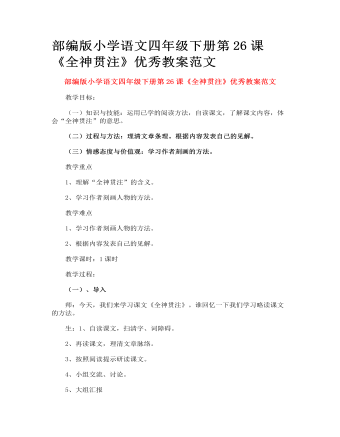
部编版小学语文四年级下册第26课《全神贯注》优秀教案范文
(一)、导入 师:今天,我们来学习课文《全神贯注》。谁回忆一下我们学习略读课文的方法。 生:1、自读课文,扫清字、词障碍。 2、再读课文,理清文章脉络。 3、按照阅读提示研读课文。 4、小组交流、讨论。 5、大组汇报 (二)、按照学习方法,进行学习。 (三)、(以小组为单位)汇报学习情况。 1、小组1:读课文,并讲解不理解的词义。 提醒易读错的字音和易写错的生字。
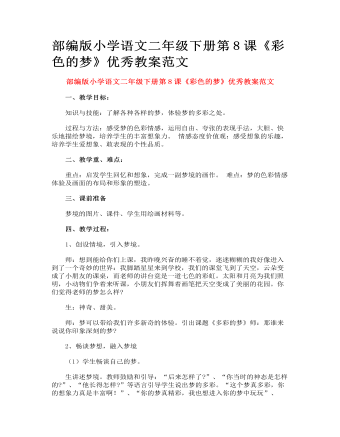
部编版小学语文二年级下册第8课《彩色的梦》优秀教案范文
创设情境,引入梦境。师:想到能给你们上课,我昨晚兴奋的睡不着觉,迷迷糊糊的我好像进入到了一个奇妙的世界:我脚踏星星来到学校,我们的课堂飞到了天空,云朵变成了小朋友的课桌,而老师的讲台竟是一道七色的彩虹。太阳和月亮为我们照明,小动物们争着来听课,小朋友们挥舞着画笔把天空变成了美丽的花园。你们觉得老师的梦怎么样?生:神奇、甜美。师:梦可以带给我们许多新奇的体验。引出课题《多彩的梦》师:那谁来说说你印象深刻的梦?
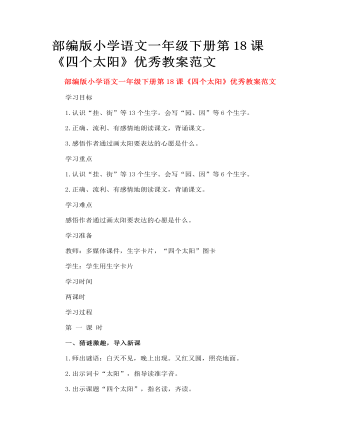
部编版小学语文一年级下册第18课《四个太阳》优秀教案范文
感悟理解,感情朗读 1.生再读课文后指名分自然段接读课文。 2.你们知道文中的小男孩分别为四季画了哪四个不同颜色的太阳吗?用“──”在文中划出。 3.指名发言,指导练读“绿绿的太阳”“金黄的太阳”“红红的太阳”“彩色的太阳” 师贴板画:“绿绿的太阳”“金黄的太阳”“红红的太阳”“彩色的太阳” 4.你最喜欢哪个季节的太阳呢? 同桌互读描写你最喜欢的那个季节的太阳的自然段 5.指名朗读,感悟理解 春天──多彩的太阳 1.指名读 2.指名再读,喜欢的齐读 3.你们看到的春天的色彩都有哪些? 4.师生合作读 夏天──绿绿的太阳 1.指名读 2.出示课件:高山、田野、街道、校园到处一片清凉。 指导朗读该句 3.男女生比读
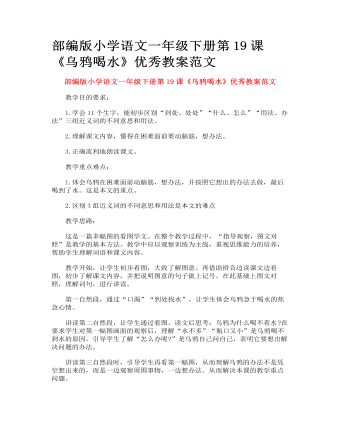
部编版小学语文一年级下册第19课《乌鸦喝水》优秀教案范文
教学思路: 这是一篇多幅图的看图学文。在整个教学过程中,“指导观察,图文对照”是教学的基本方法。教学中应以观察训练为主线,重视思维能力的培养,帮助学生理解词语和课文内容。 教学开始,让学生初步看图,大致了解图意。再借助拼音边读课文边看图,初步了解课文内容,并把说明图意的句子做上记号。在此基础上图文对照,理解词句,进行讲读。 第一自然段,通过“口渴”“到处找水”,让学生体会乌鸦急于喝水的焦急心情。 讲读第二自然段,让学生通过看图、读文后思考:乌鸦为什么喝不着水?在要求学生对第一幅图画面的观察后,理解“水不多”“瓶口又小”是乌鸦喝不到水的原因。引导学生了解“怎么办呢?”是乌鸦自己问自己,表明它要想出解决问题的办法。 讲读第三自然段时,引导学生再看第一幅图,从而理解乌鸦的办法不是凭空想出来的,而是一边观察周围事物,一边想办法。从而解决本课的教学重点问题。
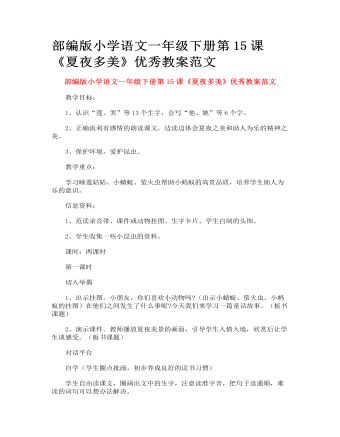
部编版小学语文一年级下册第15课《夏夜多美》优秀教案范文
1、检查读。教师以开火车的形式让学生按自然段读课文,看谁读得既正确又流利。 2、指正读。把你喜欢的小动物的话找出来读一读,教师随机指导。 3、想象读。先听范读录音,然后指名读文,边读边想象当时的情景。 4、分角色读。教师指导学生研究讨论每个角色的语气怎样读,并尝试给这些角色设计表情动作。 如:睡莲姑姑(奇怪的问):“小蚂蚁,你怎么了?” 小蚂蚁(揉肉眼睛,伤心的)说:“我不小心掉进池塘,上不了岸啦!” (让学生尝试添加提示语,是一个大胆的尝试。让学生根据生活经验和对课文的理解,给“人物”设计表情动作,添加不同的语气词,使课文变成了童话剧。由于是自己创造的成果,学生会读得有情有趣,有滋有味。但这种能力的培养不是一朝一夕的,教师要有意识的加以引导。)
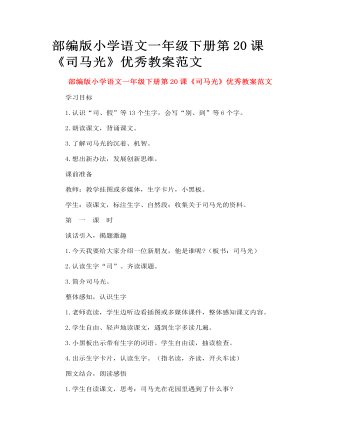
部编版小学语文一年级下册第20课《司马光》优秀教案范文
学习课文第一段。 (1)指名读,其他同学边听边想:这段主要讲的是谁?讲了他什么事?引导学生感知这段的主要内容。 (2)读第1句话,回答曹操是什么时候的人?理解“古时候”指三国时期,离现在大约有一千七百多年。 (3)读第2、3句,回答:人家送给他一头大象,他心情怎样?是怎样做的?(他很高兴,所以就带着官员和儿子去看象) (4)指导朗读。学习第二段 (1)指名读第2段,思考并回答:象是什么样子?官员们怎么做的?(使学生了解本段主要写了象又高又大,官员们边看边议论象的重量)。 (2)读第1句,看图回答:从哪地方看出象又高又大? 理解“身子像堵墙,腿像四根柱子”的意思,具体认识象的高大。 (3)再读课文,从中体会象很大。 (4)读第2句话,举例说说“议论”的意思,再回答:从官员们议论的话里你知道了什么?(象很重,官员们很想知道象有多重)。 再读这句话,读出官员们疑问语气。 (5)朗读第2段。
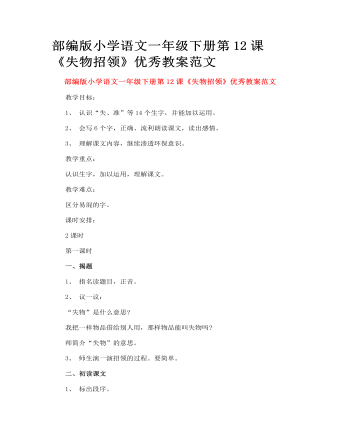
部编版小学语文一年级下册第12课《失物招领》优秀教案范文
读课文,感悟 1、 齐读第一自然段。 2、 你知道了什么时间什么人去干什么? 3、 植物园怎么样?同学们参观认真吗?你怎么知道的? 4、 指名读第一自然段,创设情境比比谁读得更棒。注意“可”要读出抑扬感。 5、 接下来的3、4、5、6自然段朗读,师读旁白,学生只要读说的一句话,但要结合叙述加进动作、表情等等。 6、 小组内练习,师巡视指导。 7、 各自读第7自然段,说说如果当时是自己在场会怎样想,怎样做。 8、 齐读第8自然段,师提示“会心的微笑”处要读得缓慢、高兴。 9、 讨论“会心的微笑”是什么意思,适当扩展。 10、 自荐读,比比谁读得更生动(从语音、语气、表情等方面评价)。 11、 各自读课文,要求: 完整、仔细,觉得有意思的地方多读读。努力读出自己的最佳样子。
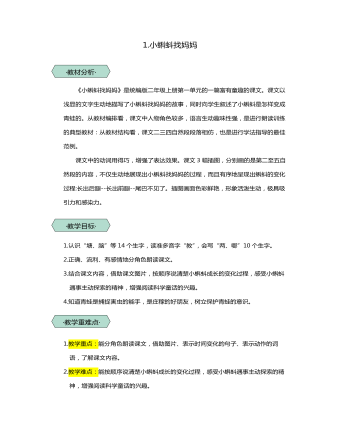
统编版二年级语文上第1课小蝌蚪找妈妈教学设计教案
《小蝌蚪找妈妈》是统编版二年级上册第一单元的一篇富有童趣的课文。课文以浅显的文字生动地描写了小蝌蚪找妈妈的故事,同时向学生叙述了小蝌蚪是怎样变成青蛙的。从教材编排看,课文中人物角色较多,语言生动趣味性强,是进行朗读训练的典型教材:从教材结构看,课文二三四自然段段落相仿,也是进行学法指导的最佳范例。课文中的动词用得巧,增强了表达效果。课文3幅插图,分别画的是第二至五自然段的内容,不仅生动地展现出小蝌蚪找妈妈的过程,而且有序地呈现出蝌蚪的变化过程:长出后腿--长出前腿--尾巴不见了。插图画面色彩鲜艳,形象活泼生动,极具吸引力和感染力。 1.认识“塘、脑”等14个生字,读准多音字“教”,会写“两、哪”10个生字。2.正确、流利、有感情地分角色朗读课文。3.结合课文内容,借助课文图片,按顺序说清楚小蝌蚪成长的变化过程,感受小蝌蚪遇事主动探索的精神,增强阅读科学童话的兴趣。4.知道青蛙是捕捉害虫的能手,是庄稼的好朋友,树立保护青蛙的意识。 1.教学重点:能分角色朗读课文,借助图片、表示时间变化的句子、表示动作的词语,了解课文内容。2.教学难点:能按顺序说清楚小蝌蚪成长的变化过程,感受小蝌蚪遇事主动探索的精神,增强阅读科学童话的兴趣。 2课时
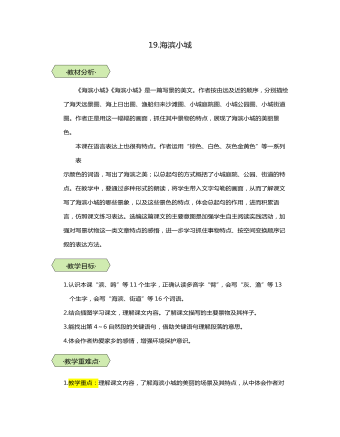
统编版三年级语文上第19课海滨小城教学设计教案
《海滨小城》《海滨小城》是一篇写景的美文。作者按由远及近的顺序,分别描绘了海天远景图、海上日出图、渔船归来沙滩图、小城庭院图、小城公园图、小城街道图。作者正是用这一幅幅的画面,抓住其中景物的特点,展现了海滨小城的美丽景色。本课在语言表达上也很有特点。作者运用“棕色、白色、灰色金黄色”等一系列表示颜色的词语,写出了海滨之美;以总起句的方式概括了小城庭院、公园、街道的特点。在教学中,要通过多种形式的朗读,将学生带入文字勾勒的画面,从而了解课文写了海滨小城的哪些景象,以及这些景色的特点,体会总起句的作用,进而积累语言,仿照课文练习表达。选编这篇课文的主要意图是加强学生自主阅读实践活动,加强对写景状物这一类文章特点的感悟,进一步学习抓住事物特点、按空间变换顺序记叙的表达方法。 1.认识本课“滨、鸥”等11个生字,正确认读多音字“臂”,会写“灰、渔”等13个生字,会写“海滨、街道”等16个词语。2.结合插图学习课文,理解课文内容。了解课文描写的主要景物及其样子。3.能找出第4~6自然段的关键语句,借助关键语句理解段落的意思。4.体会作者热爱家乡的感情,增强环境保护意识。 1.教学重点:理解课文内容,了解海滨小城的美丽的场景及其特点,从中体会作者对家乡的热爱之情。2.教学难点:能通过学习课文,体会作者热爱家乡的感情,增强环境保护意识。 2课时

新人教版高中英语必修3Unit 1 Festivals and Celebrations-Reading and Thinking教学设计
The topic of this part is “Discover the reasons for festivals and celebrations.The Listening & Speaking & Talking part aims at talking about the experiences and feelings or emotions about the festivals and celebrations. This section aims at detecting the reason why the people celebrate the festivals, the time, the places, the types and the way of celebrations. It also explains why some traditions in the old celebrations are disappearing, like the firecrackers in the big cities and some new things are appearing like the prosperity of business or commerce. 1. Students can talk about what festivals they know and the reasons and the way of celebrating them.2. Students should learn the reading skills such as the headline and get the topic sentences, the structures of articles.3. Students can understand the past, the present situation of some festival around the world and why there are some changes about them. 4. Students can have the international awareness about the festivals.1. Students should learn the reading skills such as the headline and get the topic sentences, the structures of articles.2. Students can understand the past, the present situation of some festival around the world and why there are some changes about them.Step 1 Lead in---Small talkWhat festival do you like best ? Why ?I like the Spring Festivals because I can set off the fireworks, receive the lucky money and enjoy the Gala with my families.Step 2 Before reading---Pair workWhy do people celebrate different festivals ?The Spring Festivals is to celebrate the end of winter and the coming of spring and new life.The Mid-autumn Day is to celebrate the harvest and admire the moon.

新人教版高中英语必修3Unit 1 Festivals and Celebrations-Reading for writing教学设计二
Step 3 Analyzing article structureActivity 31. Teachers raise questions to guide students to analyze the chapter structure of this diary and think about how to describe the festival experience. (1)What should be included in the opening/body/closing paragraph(s)?(2)How did the writer arrange his/her ideas?(3)What kind of interesting details did the writer describe?(4)How did the writer describe his/her feelings/emotions during the event?2. Students read and compare the three sentence patterns in activity 2. Try to rewrite the first paragraph of the diary with these three sentence patterns. After that, students exchange corrections with their partners. Such as:●This was my first time spending three days experiencing the Naadam Festival in China’s Inner Mongolia Autonomous Region and it was an enjoyable and exciting experience. ●I'll never forget my experience at the Naadam Festival because it was my first time to watch the exciting Mongolian games of horse racing, wrestling, and archery so closely. ●I'll always remember my first experience at the Naadam Festival in China’s Inner Mongolia Autonomous Region because it was so amazing to spend three days witnessing a grand Mongolian ceremony. Step 4 Accumulation of statementsActivity 41. Ask the students to read the diary again. Look for sentences that express feelings and emotions, especially those with the -ing form and the past participle. Such as:● …horse racing, wrestling, and archery, which are all so exciting to watch. ● some amazing performances● I was surprised to see…● I was a little worried about. . . ● feeling really tiredOther emotional statements:●I absolutely enjoyed the archery, too, but the horse races were my favourite part. ●I'm finally back home now, feeling really tired, but celebrating Naadam with my friend was totally worth it. ●He invited me back for the winter to stay in a traditional Mongolian tent and cat hot pot. I can’t wait!2. In addition to the use of the -ing form and the past participle, the teacher should guide the students in the appreciation of these statements, ask them to memorize them, and encourage them to use them reasonably in writing practice.

新人教版高中英语必修3Unit 2 Morals and Virtues-Discovering Useful Structure教学设计
1. 表示时间。Hearing these stories, I’m skeptical about the place. = When I heard these stories. . . 2. 表示原因。Not knowing his address, I can’t send this book to him. = Because/Since/As I don’t know his address. . . 3. 表示结果。His father died, leaving him a lot of money. =. . . and left him a lot of money4. 表示条件。Going straight down the road, you will find the department store. = If you go straight down the road. . . 5. 表示让步。Being tired, they went on working. =Although they were tired. . . 6. 表示行为方式、伴随情况或补充说明。He lay on the grass, staring at the sky for a long time. =. . . and stared at the sky for a long time注意:非谓语动词作状语时, 如所提供的动词不能和句子中的主语保持一致, 动词-ing形式必须有自己的逻辑主语, 通常由名词或代词来担任, 这就是独立主格结构。The last bus having gone, we had to walk home. (having gone的逻辑主语是the last bus, 而不是we)Weather permitting, the football match will be played on Friday. (permitting的逻辑主语是time, 而不是the football match)Step 7 Practice1. ________(study) hard, you are sure to get first prize. 2. People use plastic in their daily life, _______(leave) large amounts of waste. 3. ________(work) hard at your lessons, you are to succeed. 4. The old man, ____________(work) abroad for twenty years, is on the way back to his motherland. 5. ______________(finish) his homework, he was playing on the playground. Answers: 1. Studying 2. leaving 3. Working 4.having worked 5. Having finishedStep 8 HomeworkFinish the homework on Page 22.

新人教版高中英语必修3Unit 2 Morals and Virtues-Reading for Writing教学设计
1. 这个寓言是一个关于一位国王古寓言。 The fable is an old fable about a king.2.作者用这个故事让读者对于社区的问题负有个人责任的必要印象深刻。The author used the story to impress upon readers with the need to take personal responsibility for problems in the community.3. 这个故事十分成功的实现了它的目的。The story was quite successful in achieving its purpose.Step 7 WritingPlease write a review of the story according the outline above.The fable is an old fable about a king who thought his people are lazy, so he put a large stone in the middle of the road and hides and waited to see if anyone will try to move it.The author used this story to impress upon readers with the need to take personal responsibility for problems in the community. The story was quite successful in achieving its purpose, and I liked it because it had a clear moral.However, while the moral of the story is clear, the actions of the king seemed pointless to me, because none of the characters in the story learnt anything. For this reason, I think there are better stories that can be used to impress upon people with the need for personal responsibility.Step 8 Pair workExchange drafts with a partner. Use this checklist to help your partner revise his/her draft.1. Does the writer give a short description of the story ?2. Does the description include the most important details of the story ?3. Does the writer give his or her opinion about the character or their actions ?4. Is the review well-organised ? 5. Does the writer use the -ing form as the adverbial correctly in the writing ?6. Are there any grammar, spelling, or punctuation errors ?Step 9 HomeworkPut up your revised draft in the classroom or read it to your class.

新人教版高中英语必修3Unit 4 Space Exploration-Listening&Speaking&Talking教学设计一
Listening and Speaking introduces the topic of “talking about how to become an astronaut”. This period is aimed to inform students some details about the requirements of being an astronaut. Students can be motivated and inspired by the astronauts. Teachers ought to encourage students to learn from them and let them aim high and dream big.Listening and Talking introduces the theme of "talk about life in space". This part also informs students more details about life in space and can inspire students to be curious about this job. 1. Guide students to listen for numbers concerning dates, years and ages etc2. Cultivate students' ability to talk about how to become an astronaut and life in space ; 3. Instruct students to use functional sentences of the dialogue such as “ first of all, I am not sure, so what might be .. I guess.. I wonder…I am curious…)appropriately.1. Guide students to understand the content of listening texts in terms of the whole and key details; 2. Cultivate students' ability to guess the meaning of words in listening; discuss with their peers how to become a qualified astronaut and describe the life in space.Part 1: Listening and SpeakingStep 1: Lead inPredictionThe teacher can ask students to predict what the listening text is about by looking at the pictures.About how to become an astronaut./the requirements of an astronautStep 2: Then, play the radio which is about an interview a. And after finishing listening for the first time, the students need to solve the following tasks.

新人教版高中英语必修3Unit 4 Space Exploration-Reading and Thinking教学设计二
The theme of this unit focuses on “space exploration.” Students will learn about the training and experience needed to become an astronaut. The text is mainly about the development of space exploration. On the one hand, the text helps students to have a good understanding about the great feats humans have achieved, on the other hand, they will further understand the contributions that we Chinese have achieved, and feel confident and proud about our homeland and strengthen their love for our country. The teacher should instruct students to aim high and study harder to make great progress in the space career if possible.1. Read about the development and value of space exploration.2. Explore the mysteries of the universe and the achievements in space exploration.3. Skillfully use the vocabulary of this text to cultivate self-study ability 4. Develop cooperative learning ability through discussion.1. Enable the Ss to talk about the development and value of space exploration.2. Guide the Ss to summarize the main idea of each paragraph as well as the main idea of the text.3. Help Ss comprehend the main reasons for space exploration. Multi-media, textbook, notebooks.Step 1: Warming up and predictionLook at the title and the pictures of the text and predict what the text will be about?2. What are the main reasons for space exploration?

新人教版高中英语必修3Unit 4 Space Exploration-Reading for Writing教学设计二
⑦在我看来, 探索太空是值得的。As far as I am concerned, it is worthwhile to explore the space.Step 10 Writing---draftRecently, students in our class have had heated a discussion on whether space is worth exploring. Students hold different ideas about it.30% of us think space exploration is not worthwhile. They think space is too far away from us and our daily life and is a waste of money. And the money spent on space exploration can be used to solve the earth’s problems such as starvation and pollution.On the other hand,70% think space is worth exploring because we have benefited a lot from it,such as using satellites for communication and weather forecast. What’s more,with further space research,we may solve the population problem by moving to other planets one day. Also,space research will enable us to find new sources to solve the problem of energy shortages on the earth.As far as I am concerned, it is worthwhile to explore the space. Not only can it promote the development of society but also enrich our life. Step 11 Pair workExchange drafts with a partner. Use this checklist to help your partner revise his/her draft.1.Does the writer explain why he/she changed/wanted to change?2.Does the writer tell how the changes have improved or will improve his/her life?3.Is the text well-organised?4.Does the writer use words and expressions to show similarities and differences?5.Are there any grammar or spelling errors?6.Does the writer use correct punctuation?

新人教版高中英语必修3Unit 5 The Value of Money-Listening &Speaking&Talking教学设计
4. A:We’d like to have someone to say a word at the beginning to welcome the group.B:↙Who?A:We thought that you or Dr.Johnson might do it.B用降调说Who,其意思是问,对方想让谁在开场时致欢迎词。Step 6 Pronunciation---Practice1. Listen to the short conversation and mark the intonation with ↗, ↙ or ↙, ↗. Then discuss with a partner what they intend to convey by using different intonation.Owner: You know what ?↗ It’s a million-pound bank note↙.Waiter 1: Really ?↗(question)Waiter 2: Really !↙(unbelievable and surprised)Waiter 3: Really ?!↙↗(first question then surprised)2. Listen to the conversations. Underline the parts that are stressed and mark the intonation. Then talk about the implied meanings of the responses with different intonations. Listen again and repeat.1) Henry: It’s a nice suit.Owner: Oh, it’s perfect!↙(The intonation means it is very suitable for Henry.)2) Henry: Well, that’s very kind of you.Owner: Kind, sir ?↗(what you said is not right) No, it’s kind of you. You must come whenever you want and have whatever you like. Just having you sit here is a great honour !!↙(welcome you to come again)3)Henry:Well, to be honest, I have none. Oliver:(happily) What luck!(excited) Brother↗, what luck!↙(It means “Didn’t you hear it?”)Henry: Well, it may seem lucky to you but not to me!↗(angry) If this is your idea of some kind of joke, I don’t think it’s very funny. Now if you’ll excuse me, I ought to be on my way.↙(If so, I would leave.)Roderick: Please don’t go↙...(hope Henry can wait for a moment)Part B Viewing and Talking---Describe people’s changing attitudes in a film clipStep 1 Before-listening---Tell the filmYou are going to watch part of the film The Million Pound Bank Note. Look at these photos and guess what happens in the film.

新人教版高中英语必修3Unit 5 The Value of Money-Reading and Thinking教学设计一
Everybody wants to get wealth.In today’s material world,making money or becoming wealthy symbolizes a person’s success and capability. Many people just make every effort, pay any price to attain greater wealth. With money,they can buy nice, large apartments in nice neighborhood. With money they can own luxurious cars. Wealth seems to bring all happiness in life.But is wealth the only road to happiness? Not really. There are many things in the world, which are beyond the means of money, such as friendship, love, health and knowledge. People are so preoccupied with struggling for money that they have no time or would not take the time to form or maintain friendship. What happiness can they feel living as lonely miserable creatures without love or friends in the world even if they accumulate tremendous wealth?In my opinion, people can’t do anything without money, but money is not everything. What money will bring you depends on your personal belief and goal in life. If you are kind enough to help others, especially the poor, money is a good thing to you. With it, you can do much more for the benefit of people and your country, and it will add to your own happiness. If you want money just for your own needs, you’ll never be satisfied or happy. In a word,you should have money spent for more people. Only then can money be the source of your happiness.Step 8 Homework4 students in a group, one acts Roderick, one Oliver, one servant and the fourth one acts Henry Adams, then listen to the tape, pay more attention to the difference between American English and British English in pronunciation, stress, tone.

新人教版高中英语选修2Unit 1 Science and Scientists-Reading and thinking教学设计
Step 5: After learning the text, discuss with your peers about the following questions:1.John Snow believed Idea 2 was right. How did he finally prove it?2. Do you think John Snow would have solved this problem without the map?3. Cholera is a 19th century disease. What disease do you think is similar to cholera today?SARS and Covid-19 because they are both deadly and fatally infectious, have an unknown cause and need serious public health care to solve them urgently.keys:1. John Snow finally proved his idea because he found an outbreak that was clearly related to cholera, collected information and was able to tie cases outside the area to the polluted water.2. No. The map helped John Snow organize his ideas. He was able to identify those households that had had many deaths and check their water-drinking habits. He identified those houses that had had no deaths and surveyed their drinking habits. The evidence clearly pointed to the polluted water being the cause.3. SARS and Covid-19 because they are both deadly and fatally infectious, have an unknown cause and need serious public health care to solve them urgently.Step 6: Consolidate what you have learned by filling in the blanks:John Snow was a well-known _1___ in London in the _2__ century. He wanted to find the _3_____ of cholera in order to help people ___4_____ it. In 1854 when a cholera __5__ London, he began to gather information. He ___6__ on a map ___7___ all the dead people had lived and he found that many people who had ___8____ (drink) the dirty water from the __9____ died. So he decided that the polluted water ___10____ cholera. He suggested that the ___11__ of all water supplies should be _12______ and new methods of dealing with ____13___ water be found. Finally, “King Cholera” was __14_____.Keys: 1. doctor 2. 19th 3.cause 4.infected with 5.hit 6.marked 7.where 8.drunk 9.pump 10.carried 11.source 12.examined 13.polluted 14.defeatedHomework: Retell the text after class and preview its language points

新人教版高中英语选修2Unit 2 Bridging Cultures-Discovering useful structures教学设计
The grammar of this unit is designed to review noun clauses. Sentences that use nouns in a sentence are called noun clauses. Nominal clauses can act as subject, object, predicate, appositive and other components in compound sentences. According to the above-mentioned different grammatical functions, nominal clauses are divided into subject clause, object clause, predicate clause and appositive clause. In this unit, we will review the three kinds of nominal clauses. Appositive clauses are not required to be mastered in the optional compulsory stage, so they are not involved.1. Guide the students to judge the compound sentences and determine the composition of the clauses in the sentence.2. Instruct students to try to learn grammar by generalizing grammar rules, controlling written practice, and semi-open oral output.3. Inspire the students to systematize the function and usage of noun clause1.Instruct students to try to learn grammar by generalizing grammar rules, controlling written practice, and semi-open oral output.2.Inspire the students to systematize the function and usage of noun clauseStep1: The teacher ask studetns to find out more nominal clauses from the reading passage and udnerline the nominal clauses.

